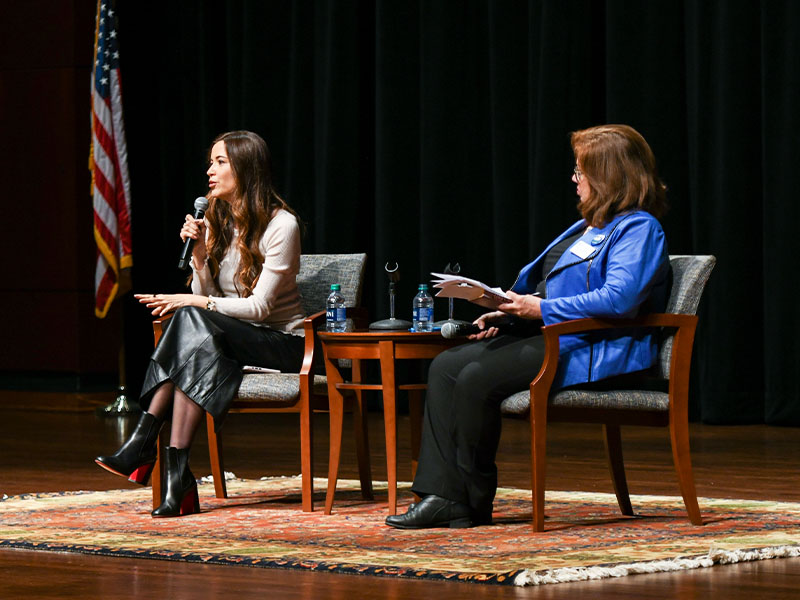First-generation White House aide talks to AU students about ‘breakaway guilt” and remaining true to yourself
December 04, 2024

Bestselling author and former White House aide Alejandra Campoverdi met with Aurora University students to talk about the challenges she faced as a first-generation college student who, as she puts it in her memoir, “First Gen,” went “from welfare to the White House” and beyond.
Campoverdi, whose memoir about navigating social mobility was released last year, answered a range of questions from students in a one-hour session at Crimi Auditorium before her appearance at AU's Celebrating Arts and Ideas event in November.
A theme throughout many of her answers was remaining true to oneself while navigating life.
“The sooner that you come to terms with the ‘real you’ and allow yourself to be contradictory and celebrate parts of yourself that supposedly don’t fit together—where you come from, where you are, and where you’re going next—that’s when you really start hitting your stride," Campoverdi said. "Your only responsibility is to be all of these pieces as unapologetically as possible.”
Campoverdi served as the first White House deputy director of Hispanic media for President Barack Obama. She holds a Master of Public Policy from Harvard University’s Kennedy School of Government and graduated cum laude from the University of Southern California.
In conversation with moderator Eva Serrano, AU associate professor of foreign languages and the coordinator of AU’s program for first-year students, Campoverdi recounted the mixed feelings of pride, melancholy, confusion, and anxiety in her journey, from being on welfare as a child growing up in a crowded Santa Monica apartment to graduating from one of the nation’s most prestigious universities and working in the nation’s highest office. Along the way, as her career advanced, she experienced rejection from former friends and “breakaway guilt”—a term used to describe the feelings of guilt that first-generation college students may experience when they leave their families to pursue higher education.
“The further you go, the more opportunities there are to feel breakaway guilt,” Campoverdi said, noting that having money often contributes to that feeling. “As bad as it feels, you don’t want to wish that feeling away. That’s the part of you that doesn’t forget where you came from. No matter what industry you go into, you’ll think of and include other peoples’ experiences.”
When asked if they had read her memoir, a majority of the students in the auditorium raised their hands. Serrano had recommended that students going through AU’s required First Year Experience course read “First Gen,” believing that Campoverdi's story would resonate with students as they pursue their own personal and academic journeys.
First-generation students comprise nearly 40% of AU's student population, and like Campoverdi, the challenges they face can be considerable. Making higher education more accessible for vulnerable populations is why AU President Susana Rivera-Mills, a first-generation student herself, established the Future Promise Fund upon her arrival at AU last year and has worked to expand support services to help first-generation students stay in school.
“When I first got to AU, I had doubts about whether I was supposed to be here,” said freshman Elijah Byanski, who hopes to be the first in his family to graduate from college. “Listening to [Campoverdi] made me feel more confident and understand that a lot of other students probably feel that way too.”
Freshman Naif Al Harby, who is the first in his family to attend college in the U.S., added, “I liked that she said there is no shame in asking questions and admitted that she too, even today, has a tough time asking for help."
Campoverdi also left some advice for what she called “First and Onlys”—the first or only members of their family or community to attend college or improve their social mobility—who she said feel compelled to be cycle-breakers in their families.
“We all know nobody is forcing you to do this,” she remarked. “If anything, sometimes we’re being dissuaded. What is that part of you that keeps choosing to do that? It’s a feeling, something in you, and maybe you can’t put into words what that is, but you keep having those dreams. That is inherent wisdom, instinct, and intuition. I wish I knew, when I was in your shoes, that it is a powerful thing.”